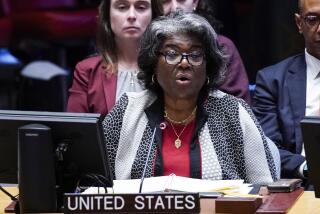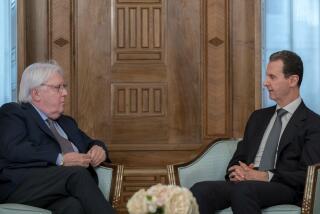Iraqis Attend Arab League Session : Diplomacy: After hasty declarations of mutual resolve to restore unity, the meeting adjourned.
CAIRO â A stern-faced Iraqi delegation joined the Arab League Council on Saturday as Arab leaders began the painstaking process of healing the wounds of the Persian Gulf War. But the victors of the conflict have made it clear that they will determine the agenda for a new Middle East.
Convening for the first time since the beginning of hostilities, Arab League delegates stepped out of their limousines at the leagueâs historic headquarters in downtown Cairo, exchanged hasty declarations of mutual resolve to restore the battered notion of Arab unity and then quickly adjourned--testimony to the fractures that still split the alliance and threaten to bedevil efforts to smooth over the warâs lingering effects.
âOur meeting today is historical by any measure, and I would not exaggerate if I said that all the eyes of the world are upon us,â said Egyptian Foreign Minister Esmat Abdel Meguid. âWe hope to make this session a bridge to cross from the pain of the present to the hope of the future . . . to construct a new Arab order built on trust.â
But Egyptâs official delegate to the gathering, Mahmoud Abul-Nasser, cautioned against expecting too much from the Arab worldâs first tentative steps toward reconciliation. âThe wounds are still open from the war,â he said.
Indeed, the hopeful resolve in Cairo landed with a thud in the Persian Gulf, where Kuwait and its neighbors made it clear that the time for healing is not yet here. âNo forgiveness, no forgetting,â Abdullah Bishara, head of the six-member Gulf Cooperation Council, said flatly in announcing a cutoff in aid to the Palestine Liberation Organization and Jordan, both supporters of Iraq during the seven-month Gulf crisis.
Egypt made it clear that the Arab coalition partners that prevailed over Iraq, led by Egypt, Saudi Arabia and Syria, are prepared now to set the agenda for the new Arab order, beginning with the Arab worldâs most fundamental and long-running dilemma, the Arab-Israeli conflict.
In spelling out the principles for establishing peace and security in the region with Arab delegates on Saturday, Meguid pointedly failed to set out any specific role for the PLO--a decided turnaround from the days before the Gulf crisis, when Egypt insisted that the PLO approve any delegation selected to represent the Palestinians in peace talks with Israel.
In an apparent signal that members of the allied coalition against Iraq are not inclined to forget the PLOâs support for Baghdad, Meguid endorsed the idea of an international conference as an âappropriate forumâ for resolving the Palestine issue, but made no mention of the PLO as the representative of the Palestinians in determining the agenda or selecting the delegates to such a forum.
Instead, the Egyptian foreign minister said efforts to resolve the Palestinian issue must be based on a number of principles that include âthe participation of the Palestinian people as an essential party in all efforts to achieve a solution.â
PLO representatives sat near the Iraqi delegation and made few public comments during Saturdayâs session, but diplomats here say there are indications that the PLO is in a conciliatory mood and is not prepared to argue the point.
âThe PLO is doing a lot of fresh thinking,â said one diplomat familiar with the peace process. âI think just now you will see them in a much more cooperative mood than before the war. Their primary protector just got nailed. Beyond that, their position with the Arabs who count now is in the toilet. Theyâre out of money. . . .â
Egyptian diplomats said the agenda of the weekend meeting was deliberately kept non-controversial and adjourned quickly in order to keep the business of the day to the minimum necessary: establishing that the Arab League, after years in exile following Egyptâs peace treaty with Israel, is officially functioning again in Cairo and that the full membership of the league is prepared to convene again in the wake of the war.
âItâs the Arab governments feeling the need to start finding their way to clearing the Arab woods and preparing the ground for renewal once the dust of Desert Storm ends,â said Tahseen Bashir, a former Egyptian diplomat who retains close ties to senior government officials.
âThis is only preparing the ground for the future, nothing more,â he said. âFor anything more, it is too early. Wounds only heal when you have a perfect agreement as to what course of healing is adopted.â
Iraqâs representative, Saad Qassem Hammoudi, a senior Foreign Ministry official, sat silently at the end of the table during the public session.
He told reporters that Iraq is determined âto put what happened behind us and look ahead to better things.â
But he said he hopes the Arab League will use its influence to act against the U.S. role in Iraq, which he said amounts to an âoccupation,â and he said the effects of the allied bombing in Iraq were âworse than Hiroshima and Nagasaki.â
However, he said the present situation in Iraq is âexcellent,â with Iraqi government forces in control of all parts of the country with the exception of âsome small spots of trouble in the north.â
âWe will eliminate them, with Godâs help,â he said.
More to Read
Sign up for Essential California
The most important California stories and recommendations in your inbox every morning.
You may occasionally receive promotional content from the Los Angeles Times.










